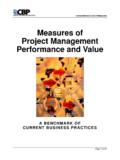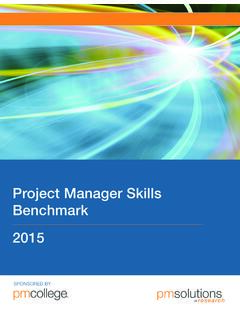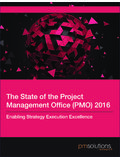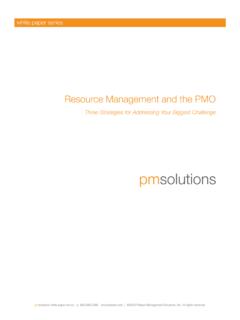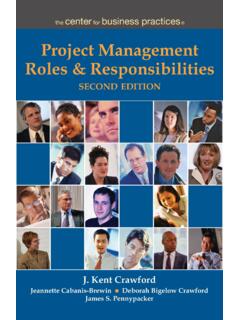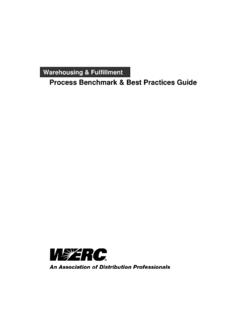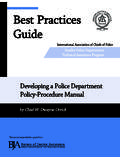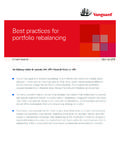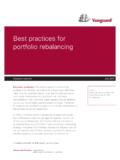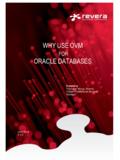Transcription of Project Management Best Practice Benchmarks
1 A PM SOLUTIONS RESEARCH COMPENDIUMSCOPECOSTSCHEDULEQ ualityProject ManagementBest Practice Benchmarks2 Project Management best Practice Benchmarks 2009 Project Management Solutions, executives want to know one thing about Project Management : What s the value? Today more than ever, every dollar invested must be justified, and any initiative must deliver positive and tangible PM Solutions Research ApproachWe first search the literature to identify current practices and challenges that we use in the development of our survey questions. Our surveys, in general, are designed to determine the extent to which organizations use these practices. In particular, we want to identify those practices that are used more often by high-performing organizations.
2 These we identify as best invitation to participate in our web-based surveys are sent to our research mailing list (senior Project Management practitioners). Responses to the survey are collected and analyzed. Summary reports are posted on our website and the full research results are available for purchase. The number of useable responses varies from 100-450, depending on the survey. Notes on Reading the Survey FindingsAverages cited are means (unless otherwise noted). Numbers are rounded off. We compare the responses of high-performing organizations to low-performing organizations to determine whether there are any particular practices that stand out and might represent best practices.
3 For the purposes of our research, high-performing organizations are those that rank in the top 25% in overall performance based on ratings in eight measures (strategy execution, shareholder satisfaction, customer satisfaction, budget/schedule performance, financial performance, resource allocation, strategic alignment, portfolio performance). Low-performing organizations rank in the bottom 25%. Project Management best Practice Benchmarks 3 2009 Project Management Solutions, research clearly demonstrates that organizations receive significant value in implementing Project Management improvement initiatives. Initiatives include implementing a PMO, a Project or portfolio Management methodology, perfor-mance measures, a governance or risk Management process, change Management , Agile PM, or Project or portfolio Management software.
4 Initiatives also include maturing existing Project and portfolio Management practices, hiring contracted PM resources, or training staff to use PM tools and Value of Project ManagementIncluding Project Management Training PracticesPM Training Benchmarks Organizations still use instructor-led training as their primar y deliver y method (42% of the time onsite and 23% of the time off-site), but the amount of time spent with e-learning methods is increasing (21% of the time). The primar y sources of training are from training companies (in 80% of organizations ) and delivered by in-house resources (76%). Most organizations offer training in PM basics (84%), but a majority also offer training in general Management (62%) and advanced Project Management topics (58%).
5 A majority of organizations (66%) do not offer a professional development program for Project managers. Organizations spend $218,000 a year on PM training on average. Organizations see positive benefits in all areas measured, but the greatest benetits are in customer satisfaction and schedule : The Value of Project Management : A benchmark of Current Business Practices, Glen Mills, PA: Project Management Solutions, Inc, Value Benchmarks Organizations saw the following improvements by implementing Project Management improvement initiatives. Requirements performance ..54% Schedule performance ..47% Time to market ..41% Quality.
6 47% Employee satisfaction ..47% Productivity ..32% Projects completed ..52% Return on investment ..46% Degree of Project risk ..27% Project -strategy alignment ..55% Customer satisfaction ..45% Number of scope changes ..22% Budget performance ..47% Average number of PM improvement initiatives implemented in each organization .. 6 Average cost of PM improvement initiatives implemented in each organization .. $7,400,000 Average cost saved due to the PM improvement initiatives in each organization ..$19,000,0004 Project Management best Practice Benchmarks 2009 Project Management Solutions, research over the past three years shows that resource Management issues are consistently the biggest challenges to organizations that Practice Project manage-ment.
7 From inadequate resource forecasting to resource contention issues: from conflicting resource priorities to inadequate information on what resources are available; our research has shown that the resource challenges faced by Project man-agement professionals significantly impact their organizations Practice Benchmarks Organizational performance improves as the resource Management maturity of the organization improves, based on our measures of performance (see page 2). There are significant challenges in all components of resource Management , but particularly issues around understanding the number of resources needed to complete projects.
8 The top five most significant challenges are: Resource capacity planning is poor Not enough appropriately skilled resources Too many unplanned requests for resources Resource use is not optimized Effort estimation is inaccurate. Organizations don t follow even the basic resource Management standards consistently using resource leveling, creating staffing Management plans, or considering the number and availability of resources required before determining schedules. There is a significant disconnect between decision makers who assume that there are enough resources for all projects when, in fact, there often are not.
9 Almost half (48%) of all organizations use automated information systems to assist in resource Management functions. But almost half of them (47%) thought the tools did not accurately calculate resource forecasts and more than half (55%) said their managers did not use the tools consistently or effectively. The following practices and characteristics show up far more often in high-performing organizations than in low-performing organizations: The organizations have strong, effective PMOs There is a clear organizational culture for sharing resources Stakeholder roles/responsibilities are clearly defined Effective Project portfolio reporting capability exists Resources understand Project Management Management ChallengesSource: Resource Management Challenges: A benchmark of Current Business Practices, Glen Mills, PA.
10 Project Management Solutions, Inc, ManagementMaturity LevelsLevel 5 Level 4 Level 3 Level 2 Level 1 Percentage of OrganizationsLow Level of Maturity High 14%3%9%31%43% Project Management best Practice Benchmarks 5 2009 Project Management Solutions, Often UsedIT Portfolio MeasuresTo be a truly powerful, credible, and useful function, Project cost Management must be considered a dynamic and integral part of the technical and financial function of an organization. Our research demonstrates that there is a strong correlation between organizational performance and the maturity of an organization s cost Management Practice Benchmarks Although fewer than half of organizations (49%) use a structured cost estimating process, there is a huge difference between the percentage of high-performing organizations that use the process (71%) and the percentage of low-performing organizations (19%).

